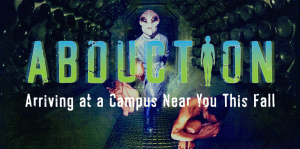
[ad_1]
For Immediate Release:
October 5, 2023
Contact:
Kendall Davis 202-483-7382
Ann Arbor, Mich. – To encourage empathy for animals who are mutilated and killed in university laboratories, PETA will visit the University of Michigan (U-M) today to launch Abduction, a unique virtual reality experience landing on college campuses across the country. In this eerie experience, visitors enter a mysterious truck containing a mobile virtual reality studio. They seemingly find themselves stranded in the desert with a couple of fellow humans, abducted by aliens, taken aboard a spaceship, and subjected to a shocking experience inspired by what animals endure in laboratories. They watch as their friends are subjected to experiments, knowing that they’ll be next.
When: October 5, 11 a.m.–4 p.m.
Where: Angell Hall, 435 S. State St., Ann Arbor
Watch the trailer here. Broadcast-quality footage of the Abduction virtual reality experience is available upon request.
At the U-M, experimenters injected acid into the eyes of rabbits, causing abnormal blood vessel growth on their retinas, a condition that can lead to severe vision loss. They seemingly conducted this experiment to test a treatment for retinal disease in humans, despite significant structural and physiological differences between human and rabbit eyes. In another experiment, nearly 80 rats were administered cocaine at just 5 weeks old. Some of them endured repeated and daily exposures to the drug. In the end, all of them were killed by decapitation using a guillotine.
Additionally, experimenters deliberately inflicted burns on pigs by applying a copper bar heated to 176° against their skin. In order to ensure that the burns were as acute as possible, they first removed all the hair from the targeted area and then pressed the rod against it for up to 30 seconds. Subsequently, the experimenters assessed the efficacy of various burn treatments on the animals. Some of them were ineffective, and one apparently failed to heal a wound even after three weeks—at which point all the pigs were killed.
“Many students don’t know that on their own college campuses, frightened and confused animals are being tormented, mutilated, and killed in cold, barren laboratories, with no way to escape or even understand what’s happening to them,” says PETA Senior Director Rachelle Owen. “PETA is on a mission to open young people’s eyes to this cruelty, help them understand what it feels like, and motivate them to join our call for a switch to superior, non-animal research.”
Studies show that 90% of all basic research—most of which involves animals—fails to lead to treatments for humans, which is why PETA is pushing universities to pivot to sophisticated, human-relevant research methods.
Abduction—which was filmed in VR180 with assistance from the virtual reality creation studio Prosper XR—has stopped at nearly three dozen college campuses over the past year, including MIT, Harvard University, the University of California–Los Angeles, and the University of Texas–Austin.
PETA—whose motto reads, in part, that “animals are not ours to experiment on”—opposes speciesism, a human-supremacist worldview. For more information on PETA’s investigative newsgathering and reporting, please visit PETA.org, listen to The PETA Podcast, or follow the group on Twitter, Facebook, or Instagram.
[ad_2]
Source link

Leave a Reply